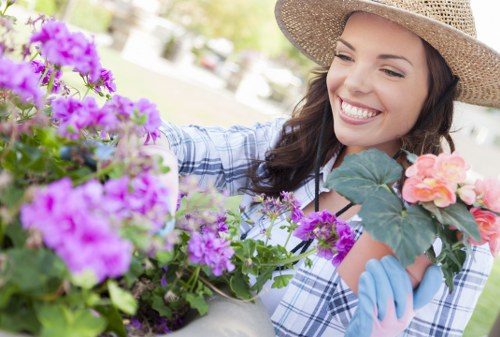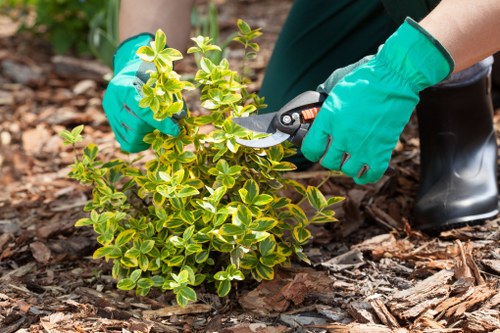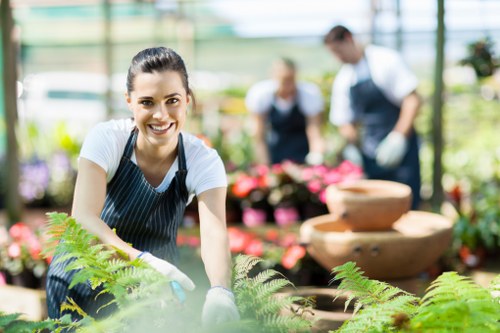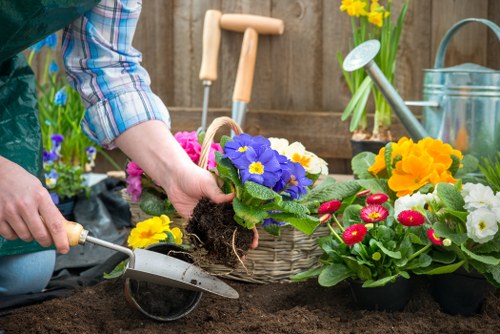Comprehensive Guide to Garden Maintenance in Plumstead
Introduction to Garden Maintenance

Maintaining a beautiful garden in Plumstead involves a combination of regular care, proper planning, and understanding the unique climate and soil conditions of the area. Whether you are a seasoned gardener or a novice, effective garden maintenance can enhance the aesthetic appeal and health of your outdoor space.
Garden maintenance encompasses a variety of tasks, including pruning, weeding, soil care, watering, and pest control. Each of these tasks plays a crucial role in ensuring that your garden thrives throughout the year.
In Plumstead, local climate patterns and soil types can influence the specific approaches you should take to maintain your garden. By tailoring your maintenance strategies to these local conditions, you can achieve optimal results.
Essential Garden Maintenance Tasks

Regular maintenance is key to a flourishing garden. Here are some essential tasks every Plumstead garden owner should consider:
- Pruning: Removing dead or overgrown branches helps plants grow healthier and more robust.
- Weeding: Keeping weeds under control prevents them from competing with your plants for nutrients and water.
- Soil Care: Regularly enriching the soil with compost or fertilizers ensures that plants receive the necessary nutrients.
- Watering: Proper watering techniques are vital, especially during dry spells common in Plumstead.
- Pest Control: Identifying and managing pests early can prevent significant damage to your garden.
By consistently performing these tasks, you can maintain a healthy and vibrant garden all year round.
Seasonal Garden Maintenance in Plumstead

Different seasons require different maintenance approaches to ensure your garden remains in peak condition. Here's a seasonal breakdown for Plumstead:
Spring
Spring is the ideal time to prepare your garden for the growing season. Start by clearing any debris from winter and pruning damaged branches. Planting new flowers and vegetables can also be done during this time.
Summer
During the summer months, focus on regular watering and mulching to retain soil moisture. Keep an eye out for pests and manage them promptly to prevent infestations.
Autumn
Autumn is perfect for planting bulbs, composting garden waste, and preparing your garden for the colder months. It's also a good time to prune certain plants and shrubs.
Winter
Winter garden maintenance includes protecting plants from frost, cleaning garden tools, and planning for the next gardening season. Some hardy plants may still need care during this time.
Choosing the Right Plants for Plumstead Gardens

Selecting plants that thrive in Plumstead's climate is crucial for easy garden maintenance. Consider the following when choosing plants:
- Climate Compatibility: Ensure the plants are suited to Plumstead's temperature and rainfall patterns.
- Soil Type: Different plants require different soil conditions. Test your soil and choose accordingly.
- Sunlight Exposure: Some plants need full sun, while others thrive in partial shade.
- Maintenance Level: Consider how much time you can dedicate to maintaining the plants.
Popular choices for Plumstead gardens include perennials like lavender and roses, vegetables such as tomatoes and lettuce, and ornamental plants like hydrangeas and tulips.
Soil Health and Fertilization

Healthy soil is the foundation of a thriving garden. Maintaining soil health involves regular testing, amending, and fertilizing to ensure optimal nutrient levels.
Using organic compost can improve soil structure, enhance nutrient content, and promote beneficial microbial activity. Additionally, applying the right fertilizers based on soil test results can address specific nutrient deficiencies.
Mulching around plants helps retain moisture, regulate soil temperature, and suppress weed growth, contributing to overall soil health.
Irrigation Techniques for Efficient Water Use
Proper irrigation is essential for garden maintenance in Plumstead, especially during dry periods. Here are some effective irrigation techniques:
- Drip Irrigation: Delivers water directly to the plant roots, reducing evaporation and water waste.
- Soaker Hoses: Allow water to seep slowly into the soil, ensuring deep watering.
- Rainwater Harvesting: Collecting and storing rainwater can provide an eco-friendly water source for your garden.
- Automated Timers: Schedule watering times to ensure consistent and efficient water use.
Implementing these techniques can enhance water efficiency, promote plant health, and reduce maintenance efforts.
Pest and Disease Management
Managing pests and diseases is a critical aspect of garden maintenance. Here are some strategies to keep your garden healthy:
- Regular Inspections: Frequently check plants for signs of pests or diseases to address issues early.
- Natural Remedies: Use organic treatments like neem oil or insecticidal soap to manage pests without harming beneficial insects.
- Crop Rotation: Changing plant locations each season can disrupt pest life cycles and reduce disease prevalence.
- Healthy Plant Practices: Strong, healthy plants are more resistant to pests and diseases.
Proactive pest and disease management ensures your garden remains vibrant and productive.
Tools and Equipment for Garden Maintenance
Having the right tools can make garden maintenance more efficient and enjoyable. Essential tools for Plumstead gardens include:
- Pruners and Shears: For trimming and shaping plants.
- Garden Fork: Useful for turning soil and aerating the ground.
- Wheelbarrow: Helps in transporting soil, compost, and plants.
- Garden Hose with Nozzle: For effective watering and irrigation.
- Hand Tools: Such as trowels, weeders, and cultivators for detailed garden work.
Investing in quality garden tools can enhance your maintenance routine and improve garden outcomes.
Landscape Design and Garden Layout
A well-designed garden layout can simplify maintenance and enhance the beauty of your outdoor space. Consider the following design principles:
Functional Zones
Divide your garden into functional zones, such as planting areas, seating spaces, and pathways. This organization helps manage tasks efficiently.
Plant Selection and Placement
Group plants with similar water and sunlight needs together to streamline care routines. Ensure taller plants do not shade shorter ones excessively.
Pathways and Access
Design clear pathways for easy access to all parts of the garden. This facilitates regular maintenance and reduces the risk of plant damage.
Mulching and Ground Cover
Use mulch or ground cover plants to suppress weeds, retain moisture, and add texture to your garden layout.
Organic Gardening Practices
Adopting organic gardening practices can lead to a healthier garden and a more sustainable environment. Key practices include:
- Composting: Recycling garden waste and kitchen scraps into nutrient-rich compost improves soil fertility.
- Natural Fertilizers: Using organic fertilizers like bone meal, fish emulsion, or seaweed extract provides essential nutrients without chemical runoff.
- Beneficial Insects: Encouraging beneficial insects like ladybugs and bees helps control pests naturally.
- Crop Diversity: Planting a variety of species can prevent pest outbreaks and promote a balanced ecosystem.
Organic gardening not only benefits your plants but also contributes to a healthier environment.
Maintaining Garden Aesthetics
Aesthetics play a significant role in garden maintenance. Here are some tips to keep your garden visually appealing:
Color Coordination
Choose plants with complementary colors to create a harmonious look. Seasonal flowers can add vibrant splashes of color throughout the year.
Plant Arrangement
Arrange plants in varying heights and textures to add depth and interest to your garden.
Decorative Elements
Incorporate garden ornaments, such as fountains, statues, or decorative pots, to enhance the overall appearance.
Regular Grooming
Consistently remove dead flowers, trim overgrown plants, and maintain pathways to keep the garden looking tidy.
Sustainable Garden Maintenance
Implementing sustainable practices in your garden maintenance routine can reduce your environmental footprint. Consider the following:
- Water Conservation: Use efficient irrigation systems and drought-resistant plants to minimize water usage.
- Recycling and Composting: Reuse garden waste and organic materials to enrich your soil naturally.
- Energy-Efficient Tools: Opt for manual or battery-powered garden tools to reduce energy consumption.
- Native Plants: Planting native species supports local wildlife and typically requires less maintenance.
Sustainable garden maintenance not only benefits your garden but also supports the broader ecosystem.
Common Challenges in Garden Maintenance
Gardening in Plumstead comes with its own set of challenges. Being aware of these can help you proactively address them:
Weather Extremes
Plumstead may experience fluctuating weather conditions, including heavy rains or dry spells. Preparing for these extremes ensures your garden remains resilient.
Soil Quality
Poor soil quality can hinder plant growth. Regular soil testing and amendments can mitigate this issue.
Pest Infestations
Persistent pests can devastate your garden. Implementing integrated pest management strategies can help control infestations effectively.
Time Management
Balancing garden maintenance with other responsibilities can be challenging. Creating a maintenance schedule can help manage your time efficiently.
By anticipating these challenges, you can take preventive measures to maintain a healthy garden.
Professional Garden Maintenance Services
If maintaining your garden becomes overwhelming, professional garden maintenance services in Plumstead can provide the expertise and assistance you need. These services offer:
- Regular Maintenance: Scheduled visits for tasks like mowing, pruning, and weeding.
- Design and Planning: Expertise in landscape design and plant selection tailored to your garden's needs.
- Pest and Disease Control: Professional treatments to manage and prevent pest issues.
- Soil and Fertilization: Soil analysis and customized fertilization plans to enhance plant health.
- Emergency Services: Quick responses to unexpected garden issues, such as storm damage or pest outbreaks.
Hiring professionals can ensure your garden receives comprehensive care, allowing you to enjoy a beautiful outdoor space without the hassle.
Benefits of Regular Garden Maintenance
Consistent garden maintenance offers numerous benefits, including:
- Enhanced Aesthetic Appeal: A well-maintained garden looks attractive and can increase your property’s value.
- Healthier Plants: Regular care ensures plants receive the necessary nutrients and are protected from diseases.
- Weed Control: Keeping weeds at bay prevents them from competing with your plants.
- Improved Soil Quality: Ongoing soil care maintains fertility and structure, promoting robust plant growth.
- Environmental Benefits: A healthy garden contributes to local biodiversity and can provide habitats for beneficial insects and wildlife.
Investing time and effort in garden maintenance reaps long-term rewards for both you and your environment.
Innovative Garden Maintenance Tips
Incorporate these innovative tips to take your Plumstead garden maintenance to the next level:
- Use Mulch Wisely: Organic mulches like straw or bark not only suppress weeds but also add nutrients to the soil as they decompose.
- Companion Planting: Planting complementary species together can improve growth and deter pests naturally.
- Vertical Gardening: Utilize vertical spaces with trellises or hanging planters to maximize your garden area.
- Smart Gardening Tools: Invest in tools with smart technology, such as moisture sensors, to optimize watering schedules.
- Crop Rotation: Rotate your vegetable plants each season to prevent soil depletion and reduce pest buildup.
These tips can enhance the efficiency and productivity of your garden maintenance routine.
Conclusion
Effective garden maintenance in Plumstead requires a blend of knowledge, planning, and consistent effort. By understanding the local conditions, selecting the right plants, and implementing best practices, you can cultivate a beautiful and healthy garden.
Whether you choose to maintain your garden yourself or enlist professional services, the key is to stay proactive and attentive to your garden’s needs.
Take the Next Step
Contact us today to learn more about professional garden maintenance services in Plumstead and transform your outdoor space into a stunning haven.